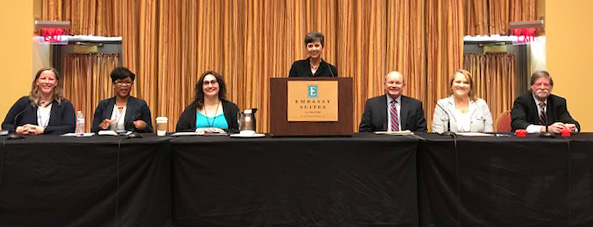Juvenile judges from across Tennessee recently held their winter conference in Murfreesboro, focusing on the effects of vicarious trauma on themselves, judicial staff, and children, as well as learning about legislative changes and new state leadership in key areas.
Tennessee Supreme Court Justice Roger A. Page and Tennessee Council of Juvenile and Family Court Judges President Judge Vicki Snyder welcomed the juvenile judges to the conference.
“I am here to represent the Tennessee Supreme Court, but you are the face of the Tennessee judiciary,” Justice Page said. “People interact with you much more than they interact with us. What you do is so invaluable for our state.”
Administrative Office of the Courts Director Deborah Taylor Tate reviewed the new Juvenile Justice Reform Implementation Council, created by former Governor Bill Haslam; the federal Families First Prevention Act; the status of the seven Safe Baby Courts currently operating in the state; and juvenile-specific resources and materials on the opioid crisis.
“The Families First Prevention Act is one of the most historic bills for juvenile law in more than 20 years,” Director Tate said. “Senator Lamar Alexander was key in getting it across the finish line. There is a lot more money for prevention, to help families before foster care is needed. DCS has not accessed the money for Tennessee yet, but I am traveling this week to learn more about the opportunities available.”
Altha Stewart, M.D, associate professor of psychiatry and director of the Center for Health in Justice Involved Youth at the University of Tennessee Health Science Center, spoke on how vicarious trauma impacts judges and youth alike.
“Vicarious trauma to judges from what they hear and see in the courtroom is very real,” Dr. Stewart said. “You are working with families daily that are traumatized and are probably standing before you in what is one of the worst moments of their lives. You are going to be impacted whether you acknowledge it or not. It might not be crippling, but it is happening.”
Over the past several years, all juvenile judges have received extensive training in Adverse Childhood Experiences (ACES) and the impact of trauma on developing brains. While this knowledge is imperative, it doesn’t always make things easier for the judge.
“Judges are in a hard position to be in because of their dual role,” Dr. Stewart explained. “On one hand, you are a member of society and you understand trauma, its impact, and what these kids have been through. But, you also have a duty to uphold the law. A child’s behavior often collides with the law and what it requires regardless of the reasons for that behavior.”
Dr. Stewart encouraged the judges to use their knowledge to help break the cycle of predictive patterns.
“If you are in the water, you are going to get wet. Judges are seeing the worst. It is especially difficult when the person before you is young, with their whole life in front of them, and you can predict what is going to happen,” she said. “Judges can use protective factors to influence predictive factors. Expand the protections around the child – including, excluding, referring – make decisions that can break predictive factors and help that child not continue in the criminal justice system.”
The judges also heard a discussion on changes in adoption law led by lawyer Dawn Coppock and Judge Tim Irwin.
For the final panel, there was a question and answer session between the judges and key state agencies and organizations serving Tennessee children. The panel included Department of Children’s Services Commissioner Jennifer Nichols, Chancellor Daryl Fansler, Fred Simmons from the Casey Family Programs, and Morenike Murphy, Elizabeth Reeve, and Keri Virgo from the Department of Mental Health and Substance Abuse Services.
“We all have the same mission and that is to keep children safe,” Commissioner Nichols said. “That is our common starting point. I am not a prosecutor anymore, but that does not mean the decisions I make should hurt a prosecution, or stop a prosecution from happening.”
Commissioner Nichols stressed her agency is focused on making small, impactful changes to improve services now while it dives deeper into some of the big issues.
“Just a few short weeks into this administration and we are already making a difference,” she said. “I promise you we are looking at the list of kids in detention every single day and making sure there is a reason that child is staying in detention, and it’s not just because we don’t have a bed or there is administrative red-tape.”
In addition to the discussion about DCS, the judges also reviewed the multitude of services available to children and families having a mental health, behavioral, or substance abuse crisis and how judges can access these services on a regular basis or after hours. For example, there are 13 mobile mental health crisis teams in the state, including four that are specific for juveniles. In addition, the System of Care Across Tennessee program is focused on providing intensive services to the children with the most need.
Simmons reviewed the Casey Foundation’s work in Tennessee on juvenile justice, ACES, Safe Baby Courts, and three-branch initiatives.



